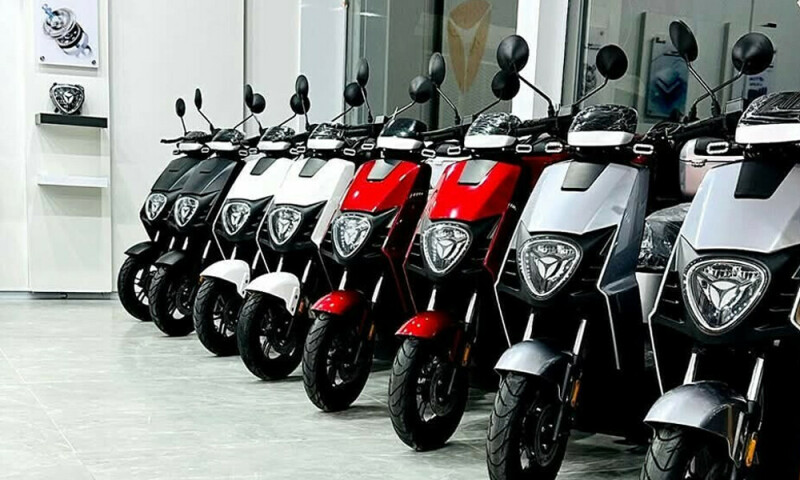Electric bikes and scooters have seen a surge in popularity across Pakistan in recent years, as more people turn to electric vehicles (EVs) to escape soaring fuel costs.
In the last 4 years, the production of e-two-wheelers in the country has increased by over 200%, as per Engineering Development Board’s (EDB) data shared by Automark Magazine.
The EDB data shows that in the year 2021–2022, EV scooter production was at 7,377 units, which increased to 22,404 units by the year 2024–25.
Former Chairman of the Association of Pakistan Motorcycle Assemblers (APMA) Muhammad Sabir Sheikh told Business Recorder that EV bikes were rapidly gaining popularity in Punjab province, although their popularity was relatively lower in Karachi, the country’s largest city.
Sindh govt, Dewan Group look to introduce 500 electric taxis in province
He stated that the lack of road infrastructure in Karachi was the main reason for the lower popularity of e-two-wheelers. However, the environment-friendly nature and the exceptional fuel savings have compelled people to shift to them.
Sheikh urged the Sindh government to immediately begin work on road infrastructure in the first phase, and in the second phase, to allocate separate lanes for e-two-wheelers.
He mentioned that since EV bikes were more popular among women, implementing such policies could increase the sale of two-wheelers.
Bike riders have started shifting towards electric ones due to rising fuel costs and the growing need for affordable transportation. With petrol prices fluctuating and often becoming unaffordable for daily commuters, EV bikes and scooters offer a cost-effective alternative.
The former chairman informed that new bikes must be registered within 30 days, failing which the Sindh government imposes a fine of PKR 5,000.
He demanded the Sindh government to extend this 30-day registration period to one year.
According to an SRO issued by the Sindh government, whether a vehicle is imported by an owner, showroom dealer, or any individual, or manufactured locally, it must be registered within 30 days under Section 23—starting from the date of the Goods Declaration (GD) / Bill of Entry (BOE) in the case of imports, or the invoice date in the case of locally manufactured vehicles.
The former APMA chairman stated that there was no financing facility available for e-two-wheelers in Pakistan.
“If the government or banks offer financing options, the sale of environment-friendly bikes and scooters can increase significantly.”
It may be noted that the Sindh government earlier this year announced that it would provide free pink electric motorcycles to female students and working women in the province. As per details, the initiative will introduce approximately 1,000 electric motorcycles for women, which will be allocated through an open and transparent balloting process.
“The initiative requires Rs300 million to be obtained outside the budget. The cabinet noted that an increasing number of women worldwide are opting for electric motorcycles as their primary mode of transport for daily commuting,” a statement from Sindh’s Chief Minister House read then.
Sheikh emphasised that the environmental challenges faced by Pakistan could only be tackled by transitioning from fuel combustion engines to EV engines.
According to Sheikh, EV bikes and scooters are available in Pakistan at a price range of Rs160,000 to Rs300,000.
As for batteries, new ones range from Rs58,000 to Rs98,000, he informed.
EV bikes and scooters typically use a set of six 12-volt batteries. Each battery has a lifespan of 1,000 life cycles, meaning it can be charged a thousand times. Charging time ranges from six to eight hours, and the scooter can reach speeds up to 55 km/h.
An e-two-wheeler can travel up to 100 kilometers on a single charge. However, if battery efficiency declines, this range can drop by 15 to 20%, according to Sheikh.
“In terms of maintenance, EV bikes are relatively expensive because spare parts are not readily available in Pakistan and have to be imported, which increases maintenance costs.”
Can ride-hailing, logistics and delivery companies lead an EV revolution in Pakistan?
In January 2025, under the chairmanship of Federal Finance Minister Senator Muhammad Aurangzeb, a meeting was held regarding the new Energy Vehicle Policy 2025. The policy aims to tackle key challenges in the adoption and production of EVs and to set ambitious goals for a transition to clean energy in the transport sector.
The EV Policy 2025–2030 lays out a determined roadmap to transition Pakistan’s entire transport sector from fossil fuels to electricity. Designed by the Ministry of Industries and Production, it aims to reduce dangerous greenhouse gas emissions, cut dependency on imported fossil fuels, and promote the development of green technology.
The policy has set a key target: 30% of all new vehicle sales to be electric by 2030, and 90% by 2040.


